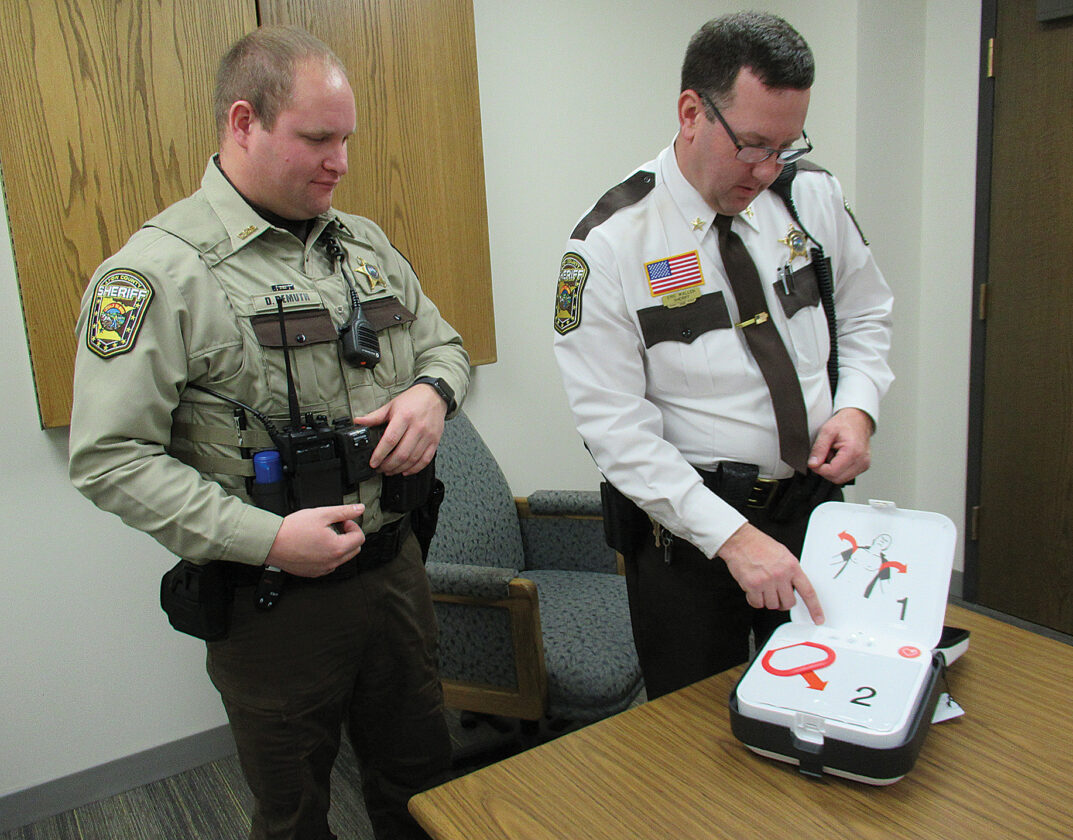There when it counts
Lyon County Sheriff’s Office receives defibrillators through grant program

Photo by Deb Gau Deputy Dustin Demuth and Lyon County Sheriff Eric Wallen talked about some of the features of the new automated external defibrillators (AEDs) the Lyon County Sheriff’s Office has received. AEDs can give life-saving treatment for people having a sudden cardiac arrest.
MARSHALL — When a person is experiencing a cardiac arrest, every second counts. Now, the Lyon County Sheriff’s Office will be more ready to respond to such an emergency with new automated external defibrillators (AEDs) deputies will carry in their patrol cars.
The Lyon County Sheriff’s Office recently received a total of 17 AEDs, funded through a grant to the University of Minnesota Medical School. AEDs are devices that can give life-saving treatment in the case of a sudden cardiac arrest.
“This gives us the opportunity to provide immediate or early care,” said Sheriff Eric Wallen. “Time is of the essence in a cardiac arrest.”
Wallen said the Sheriff’s Office had AEDs, but in the past the department only had about six of the devices. Now, he said, “This puts one in every one of our patrol vehicles.”
The AEDs were funded through a grant from the Leona M. and Harry B. Helmsley Charitable Trust. A news release said the Helmsley Charitable Trust awarded $18.8 million to the University of Minnesota Medical School to provide Minnesota law enforcement officers and first responders with more than 8,300 AEDs.
“We know in Minnesota first responders often have great distances to cover. This funding will ensure those who get to the scene before EMS arrives give patients a better shot at survival,” Helmsley trustee Walter Panzirer said in the news release.
Wallen said he had heard about the AED grant through the Minnesota Sheriffs’ Association.
“We reached out to them and said ‘We’re interested,'” he said.
In addition to receiving the 17 AEDs, the Lyon County Sheriff’s Office sent Deputy Dustin Demuth to attend a training on the new devices earlier this fall.
When one of the new AEDs is opened and turned on, a voice prompt gives instructions on how to use the device. An AED can detect a patient’s heart rhythm and determine if an electric shock should be administered, Demuth said. What’s new about the AEDs the Sheriff’s Office received is that they can assess the heart rhythm at the same time as a responder is performing CPR.
The new AEDs also have options to give the voice prompts in English or Spanish, and settings for adult and pediatric patients.
“It’s somewhat a smart device,” Wallen said. Under the arrangement that provided the AEDs, the Sheriff’s Office will send data on the devices’ use to the U of M, he said.
The information collected will allow the university’s Center for Resuscitation Medicine to improve response to cardiac arrest, the Helmsley Trust said.
The AEDs the Sheriff’s Office had before the grant program will be relocated to public buildings like the Lyon County Government Center to help expand access to them, Wallen said.
Wallen said the Sheriff’s Office was thankful for the opportunity to be part of the AED grant project.
“I think we’re very fortunate to be able to have it,” he said.


